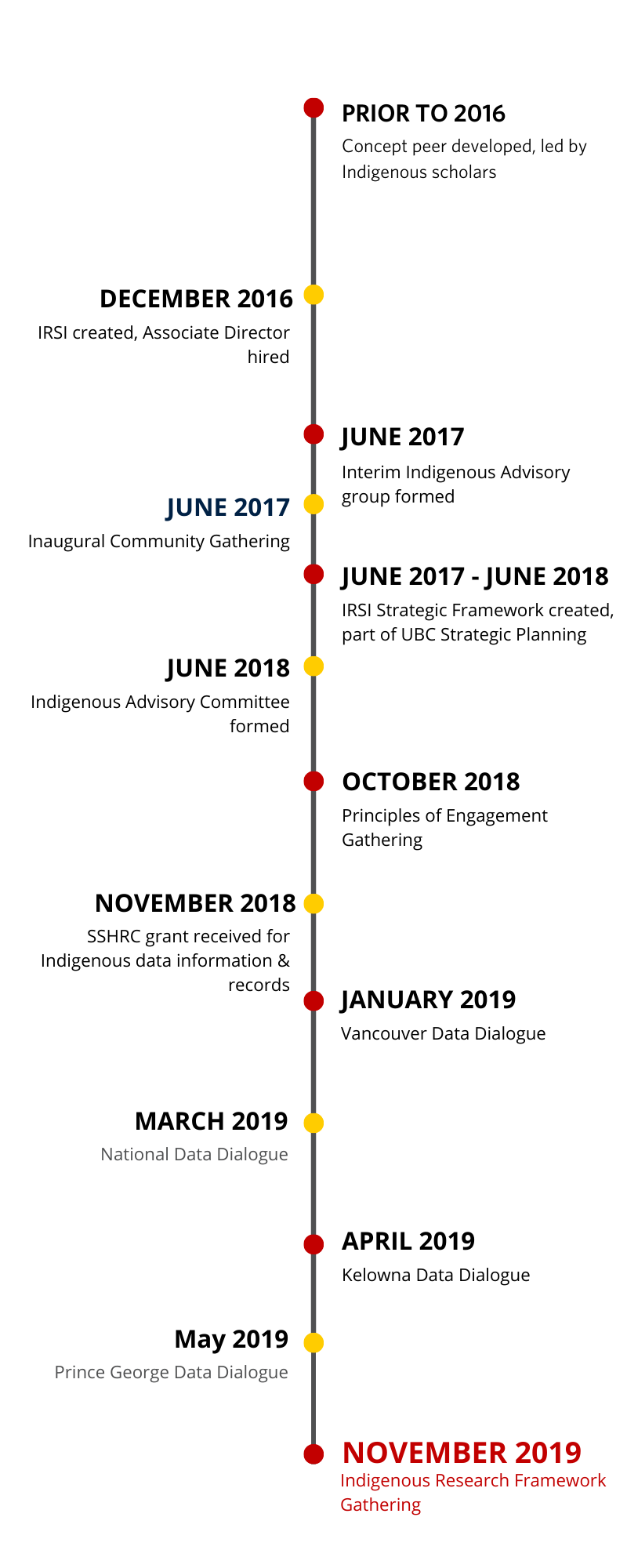 As many reading this article will know, beginning shortly after its inception in late 2016, IRSI has hosted or co-hosted a series of engagement gatherings at UBC, Musqueam, and around the province. Starting with the conceptualization and creation of IRSI, the timeline on the right shows the history of engagement gatherings and dialogues held over the past three years.
As many reading this article will know, beginning shortly after its inception in late 2016, IRSI has hosted or co-hosted a series of engagement gatherings at UBC, Musqueam, and around the province. Starting with the conceptualization and creation of IRSI, the timeline on the right shows the history of engagement gatherings and dialogues held over the past three years.
Each gathering brought together Indigenous leaders, administrators and community members, academic researchers, librarians, archivists and others working with Indigenous research and data, creating a space for open dialogue and a sharing of ideas around what exactly the Indigenous Research Framework would look like.
The objective of engagement was to involve research collaborators-both those based in community and those at UBC and other institutions-in the co-creation of a Framework for Indigenous research at UBC.
The Indigenous Research Framework will be built upon three pillars, or sets of guiding principles:
- Principles of Engagement for Indigenous, community-based research
- Principles for Indigenous Data Governance
- Ethics specific to Indigenous research
Work to date has focussed on the first two pillars: Principles of Engagement and Principles for Indigenous Data Governance. These two sets of principles were presented, in draft form, at the most recent gathering, held at Musqueam Cultural Centre in November of 2019. Now that they have been reviewed and feedback has been provided by a number of groups and individuals, we are releasing them more widely. The draft principles can be downloaded below:
Download Draft Principles of Engagement
Download Draft Principles for Indigenous Data Governance
Why is a Framework for Indigenous research necessary?
UBC, like most, if not all, major research institutions in North America has a legacy of extractive and imbalanced research practices involving Indigenous Peoples. For many decades, Indigenous research was premised on the idea that research expertise lay within the academy, and Indigenous communities and people were treated as research subjects and not partners. UBC recognized many years ago that the paradigm of community-based research needed to shift dramatically, but without a guiding framework, antiquated and colonial methods and approaches can still emerge, even when good intentions are present.
UBC has made commitments to endorse and enact the calls-to-action of the Truth and Reconciliation Commission of Canada, the calls-to-justice of the National Inquiry into Missing and Murdered Indigenous Women and Girls, and the United Nations Declaration on the Rights of Indigenous Peoples. Together with the Indigenous Strategic Plan (ISP) for UBC (currently in draft form), an Indigenous Research Framework will provide guideposts for the way forward to meet these calls and in the way UBC engages with Indigenous communities. And like the ISP, it's critical that the research framework be developed collaboratively with community partners in order that their voices and needs are privileged.
"It has to be a partnership."
In this short video, Chief Richard Sydney of the Teslin Tlingit Council explains why it's imperative that UBC's Research Framework and future Indigenous engagement be grounded in a set of guiding principles for how researchers engage with communities:
What are the next steps?
In 2020, we will be working to co-develop the third pillar of the Indigenous Research Framework: ethics guidelines and processes to support Indigenous, community-based research. To guide this work, we have convened an Indigenous ethics steering committee comprised of Indigenous and non-Indigenous faculty and staff who are familiar with the existing Behavioural Research Ethics (BREB) process and with Indigenous research methodologies.
Of course, creating principles is only an early step in achieving a full transformation in the way that Indigenous research and data management is done. Putting those principles into action is the critical next phase, and this will involve ongoing work to communicate the new approaches and to create support and resources for researchers and communities through the necessary shifts.
Lastly, we recognize that creation and adoption of the Framework and its principles is an ongoing process and that as we are breaking new ground we will need to constantly listen and adapt as required. Accordingly, we have published both sets of principle in DRAFT format and will continue to seek input and guidance, in particular from Indigenous community partners. If you have any feedback on the draft principles, please send your comments to irsi.info@ubc.ca.
To stay apprised of the work IRSI is doing to create an Indigenous Research Framework, including accessing any related documents, please visit the Transforming Research page of this website.
